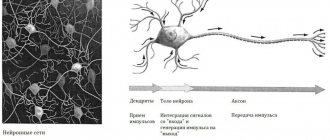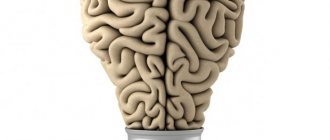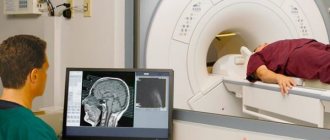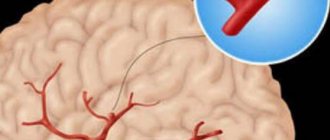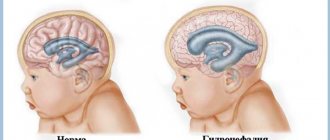For many years, alcoholism has been a serious medical and social problem. By abusing alcoholic beverages, a person puts his health at great risk. All internal organs suffer; many serious pathologies are caused by the effects of alcohol on the brain.
Most of the negative changes that occur in the brain under the influence of alcohol are irreversible.
Effects of systematic alcohol consumption on the brain
Drinking alcohol is quickly absorbed into the blood, which carries it to all systems and organs. The brain is most actively saturated with blood, and therefore the concentration of ethanol in it quickly reaches a high concentration. Being an excellent solvent, alcohol easily passes through all protective barriers and membranes that protect the brain from the penetration of viruses, bacteria and metabolic products.
Once inside the brain, toxic substances (ethanol itself and its metabolites) disrupt connections between neurons responsible for processing, storing and transmitting information between different parts of the brain and forming various brain functions, memory and consciousness.
Has a negative impact
Even a single dose of alcohol has a negative effect on the human brain, but this harm cannot be compared with the destructive effect that the organ is exposed to during systematic drunkenness. Not only are neural connections disrupted, but alcohol also significantly inhibits the growth of new cells. Alcoholics also often have a deficiency of vitamin B1, which can lead to acute brain damage due to which neurons die.
Due to systematic alcohol abuse, the tissue of the cerebral cortex is destroyed, which can cause such a serious disease as alcoholic dementia or, in other words, dementia.
The effect of alcohol on blood vessels
Alcoholic drinks have an extremely negative effect on the condition of blood vessels. Immediately after entering the body, ethyl alcohol causes vasodilation, but this condition does not last long, and then the vessels sharply narrow. Sometimes the narrowing is accompanied by a spasm.
This provokes an increase in pressure, the load on the walls of blood vessels increases, and they wear out faster. With this condition of the vessels, frequent hemorrhages are possible. With systematic alcohol consumption, the risk of stroke increases sharply.
In addition, ethanol increases the permeability of capillaries. Because of this, alcoholics are more likely to have brain swelling.
Oxygen starvation of the brain
Ethyl alcohol destroys the membranes of red blood cells, which causes them to stick together. Clots form in the blood, which can cause blockage of capillaries. This leads to disturbances in the functioning of the heart, slowing blood flow and, as a result, insufficient supply of oxygen and nutrients to the brain.
Brain hypoxia is manifested by a state of intoxication and excessive excitability. After drinking alcohol, brain cells die en masse as a result of oxygen starvation, which leads to severe pathologies (for example, atherosclerosis) and disruption of basic brain functions.
Alcohol and memory
Human memory is regulated by a paired part of the brain called the hippocampus. The neurons in this section receive signals from the cerebral cortex and convert them into short-term and long-term memory. Alcohol has a detrimental effect on connections between neurons in the human brain. As a result, hippocampal cells become isolated from other neurons, causing memory impairment.
Memory suffers
With alcoholism, short-term memory suffers most. Often a person cannot remember several hours of the past evening; they seem to fall out of his memory. But this is not the only violation. The next day after drinking, a person experiences a significant weakening of memory; it is more difficult for him to concentrate and remember any information.
The more often and more alcohol a person drinks, the more significant the destructive processes occurring in the brain. Over time, symptoms of alcoholic dementia appear, that is, weakening of mental activity.
The basic principle of action of alcohol-containing drinks
Whether alcohol expands or constricts blood vessels can be understood by the effect of alcohol on their walls:
- Immediately after drinking alcoholic beverages, the blood vessels dilate and the person feels better. Blood pressure drops, blood vessels relax, blood moves easily, and the number of heart contractions increases.
- Then a sharp narrowing of blood vessels occurs, pressure rises, metabolic processes are disrupted, which adversely affects cells and tissues.
- These states alternate, the frequency of changes depends on the volume of alcohol consumed.
- The functioning of the cardiovascular system is disrupted, and the load on the heart is greatly increased.
This condition lasts until alcohol is completely removed from the blood, as the body fights toxic ethanol. Removal of toxins is carried out through the liver.
Symptoms of alcohol's effects on the brain
It is not difficult to notice the harmful effects of alcohol on the human brain. Alcohol affects all parts of the brain and nervous system, causing the following symptoms:
- impaired coordination of movements and gait (occurs due to the effect of alcohol on the cerebellum, which coordinates motor activity);
- drowsiness (occurs due to the effects of alcohol on the medulla oblongata);
- slurred, confused speech;
- deterioration of the thought process, inability to concentrate;
- memory losses;
- loss of control over your words and actions.
All these signs can appear even after a single dose of alcohol. If a person drinks alcohol regularly, then due to the death of brain cells, the organ ceases to function normally, which manifests itself in a decrease in intellectual abilities, the inability to think logically and make decisions.
How does alcohol affect the blood vessels of people with high cholesterol and atherosclerosis?
In small quantities, alcohol has a beneficial effect on cholesterol. Atherosclerosis significantly affects the arteries due to the accumulation of salts on their walls. The latter become denser, their elasticity deteriorates, their diameter decreases, and there is a high risk of blood clots.
As pressure increases, the risk of rupture or narrowing of blood vessels greatly increases. This often causes a cerebral infarction with tissue death and stroke. The development of a heart attack of the liver, spleen, intestines, and heart is possible.
Features of the impact on adolescents
A teenager's body is still in its developing stages, so alcohol causes much more significant damage to it than to an adult's body. Since the liver cannot yet produce enough enzymes, alcohol enters the blood almost in its pure form.
Even after a small dose of alcohol, the teenager’s brain receives a large share of poison, which has a detrimental effect on the condition and functionality of the organ and the entire central nervous system. And given the fact that teenagers still cannot control themselves and drink until the alcohol runs out, the dose taken can be very impressive.
Drunk teenager
The consequences appear very quickly. A drinking teenager is rapidly deteriorating. He has difficulty learning new information and cannot concentrate. Problems arise with logical thinking, memorization, and emotional development. Alcohol-related dementia develops faster in adolescents than in adults.
Alcohol constricts or dilates blood vessels
Initially, alcohol dilates blood vessels, but at the same time increases the number of contractions of the heart muscle, which leads to an increase in the volume of blood ejected. Such an action adversely affects the human condition.
After a few minutes, ethanol enters the bloodstream and remains there for about seven hours. This leads to an increase in heart rate, disturbances in blood circulation and metabolic processes.
A large amount of hormones - norepinephrine and adrenaline - are released into the blood, which often provokes mental disorders and stress.
What diseases can be caused by alcohol?
The brain of a drinking person is gradually destroyed, all cognitive functions are disrupted, and the central nervous system suffers. This is fraught not only with changes in the behavior and psycho-emotional state of the alcoholic, but can provoke many serious, sometimes fatal diseases. Among them:
- alcoholic encephalopathy;
- dementia;
- delirium tremens (delirium tremens);
- various psychoses;
- mental disorders (delusions of jealousy, paranoia, hallucinations);
- Korsakoff's syndrome;
- cerebral edema.
In theory, it is possible to restore the brain even after prolonged drinking, but in practice the situation is somewhat different. At a certain point, the organ becomes so damaged that it can be considered a point of no return - it is no longer possible to completely restore the brain.
Alcohol and leg vessels
If a person drinks excessively for a long time, he soon develops characteristic problems with the blood vessels in his legs. After the next feast, many people experience painful sensations in their legs, and for some, their limbs completely fail. The reason for this is ethanol.
With constant alcohol abuse, severe pressure is exerted on the blood vessels. At the same time, large vessels become enlarged, and small ones become clogged, so the limbs suffer from impaired blood circulation. This can lead to the death of cells and tissues of the lower extremities, which will cause the appearance of gangrene and then the question of amputation of the limb will inevitably arise.
As mentioned above, alcohol constricts blood vessels, but before that it dilates them, and if you drink excessively, alcohol will cause severe dilatation of the veins, which can provoke the development of lesions in the lower extremities, and the legs will simply give out.
With large doses of alcohol, drinkers may experience severe swelling of the limbs. The reason for this is the accumulation of fluid in the tissues of the body, caused by the same alcohol.
Alcohol has a diuretic effect, which results in active leaching of calcium from the body. Therefore, before the lower limbs fail, the alcoholic experiences pain and cramps.
The appearance of seizures against the background of alcohol abuse indicates the development of serious nervous system lesions, so soon after such manifestations the alcoholic’s legs simply fail, irreversibly.
The characteristic spasm of blood vessels after alcohol leads to the development of many pathologies. Therefore, all problems and disturbances in the activity of individual structures of the body that are of alcoholic origin require mandatory abstinence from strong drinks, and forever. If you don’t have the willpower to completely stop drinking alcohol, then get ready for the fact that one day your legs may fail, or you may have a stroke or heart attack.
Thanks to the circulatory system, the human body functions smoothly. After all, blood is the first link between organs.
When consuming alcoholic beverages, a person undergoes strong changes.
Alcohol has a significant effect on blood vessels in the body.
Scientists have carefully studied and continue to study the consequences of drinking alcoholic beverages, discovering new facts confirming the harm of alcohol.
How to protect your brain from the effects of alcohol?
The best way to protect your brain, and indeed your entire body, from the harmful effects of alcohol is to completely eliminate alcohol from your life. After giving up alcohol, the condition of internal organs, including the brain, gradually normalizes.
But such a radical measure is not suitable for everyone, because there is habit, tradition, environment and many other compelling and not so compelling arguments in favor of moderate consumption of alcoholic beverages.
In this case, it is necessary to reduce the frequency of administration and dose as much as possible, and also follow a few simple rules:
- on the day of the feast and immediately during it, drink a lot of clean water;
- before drinking alcohol, eat a hearty meal, but avoid fatty, heavy foods;
- Do not mix alcohol with carbonated drinks.
The next morning you should take the sorbent, drink a lot of water, herbal tea, and take a walk in the fresh air.
Harm of alcohol to blood vessels
The harm of alcohol is obvious. It leads to disturbances in the functioning of the heart and blood vessels due to an excess of adrenaline and norepinephrine when consumed. With an increased number of contractions of the heart muscle, red blood cells stick together, which can clog the lumen (a characteristic mesh is visible on the skin).
The capillaries of the brain cannot withstand the load and are destroyed, which causes a micro-stroke; it is often confused with a hangover. Brain cells under the regular influence of alcohol begin to die, aggravating the person’s condition.
Regular exposure to ethanol on blood vessels causes a number of diseases:
- A hypertensive crisis develops.
- Atherosclerosis.
- Anemia.
- Chronic kidney diseases.
- Increased pressure.
- Insufficiency of coronary vessels in acute form.
- Violation of the structure of the heart.
Alcoholic drinks increase mortality among young people, causing strokes and heart attacks, and ischemic diseases.
Many people mistakenly believe that drinking alcohol in small doses has a beneficial effect. It's a delusion. What's actually happening:
- Alcohol helps to relax the body, but in the morning a person suffers from a hangover, accompanied by pain in the head.
- Ethanol helps relieve pain, but after a certain time the symptom manifests itself with double force.
- Alcohol reduces high blood pressure, but over time it leads to wear and tear of blood vessels and disruption of the circulatory system.
People who drink alcohol talk about their positive effect on vascular diseases. But it should be remembered that the alternation between narrowing and dilation of blood vessels leads to disruption of the speed of blood movement.
As a result, constant pressure surges are observed, and later regular headaches and tinnitus appear.
Recovery methods
For a person who has decided to give up addiction and return to normal life, the question of how to restore the brain after alcoholism is more than relevant. The basic rule is a complete abstinence from any alcohol-containing drinks.
Complete abstinence from alcohol
To restore the brain after prolonged alcohol use, drug therapy (nootropic and vascular drugs, vitamin complexes) is used. These drugs improve brain activity. The brain recovers very slowly, and it is impossible to say exactly how long it will take; the process can take several years. One hundred percent recovery cannot be guaranteed either. The result largely depends on your drinking experience.
Treatment for alcoholic dementia is quite effective in the early stages. If you consult a doctor in a timely manner, it can be completely cured. As the disease progresses, irreversible consequences develop. In this situation, a complete cure is no longer possible; you can only slow down the process.
Alcohol dilates or constricts blood vessels
Alcohol does dilate blood vessels, but at the same time it increases the heart rate.
A similar dilemma worries many people. Tests have shown that alcohol dilates blood vessels, but only for a short time. After a fairly short time, all vessels narrow sharply. Similar processes are observed with every consumption of strong drinks. Such sudden expansion and contraction are very harmful to the vascular system. If they occur systematically, then cardiovascular activity is disrupted, organic cellular structures experience nutritional deficiency, and metabolism slows down.
Therefore, the opinion that alcohol and dilated blood vessels are interconnected, and the effect of alcohol is beneficial, is only partially true. Alcohol can lower blood pressure, but after a few hours, when the ethanol is processed, they will narrow back down. This is the result of a single consumption of alcohol, which is observed with each serving of strong drink. With each subsequent glass, the walls of the blood vessels will expand and contract, which will certainly lead to wear and tear of the vascular tissues, and then the heart. Therefore, you should not use alcohol as a home remedy for dilating blood vessels, otherwise over time it can lead to a completely opposite effect.

